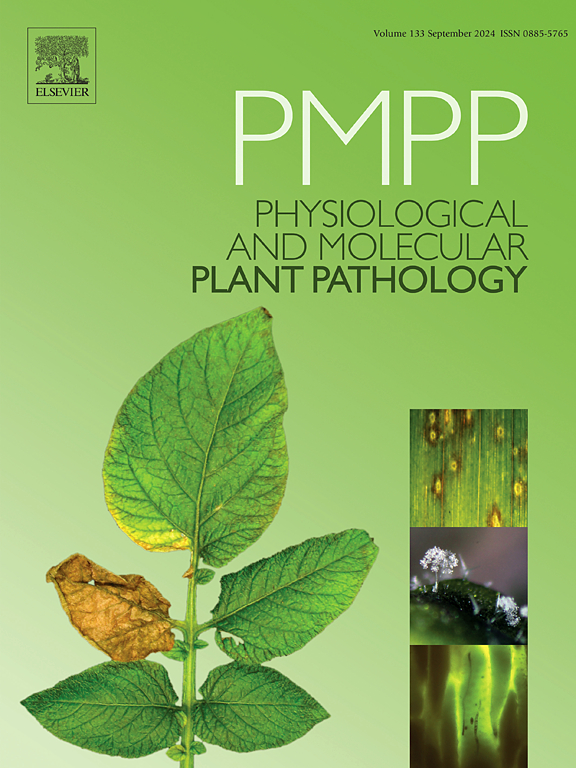与柑橘相关的疫霉:多样性、诊断和综合管理,以印度为重点
IF 3.3
3区 农林科学
Q2 PLANT SCIENCES
引用次数: 0
摘要
疫霉是一种具有侵袭性和世界性的卵菌病原体,在世界范围内对柑橘作物造成了严重的危害,造成了相当大的产量损失和经济影响。这篇综述提供了对影响柑橘的疫霉的多样性、诊断、基因组学、流行病学和可持续管理策略的全面更新,并特别关注印度柑橘的情况。我们讨论了疫霉属的分类多样性,重点讨论了那些与柑橘最常见的物种,如烟草疫霉(P. nicotianae)、柑橘疫霉疫霉(P. citrophthora)和棕榈疫霉(P. palmivora),以及其他引起柑橘根腐病、颈腐病、牙龈病和其他破坏性疾病的物种。这篇综述还强调了诊断技术的进步,特别是分子技术,如PCR、下一代测序、环介导的等温扩增和DNA元条形码,这些技术已经彻底改变了早期检测和病原体监测。概述了疫霉物种的全球分布模式,并将印度的数据和管理实践用作区域案例研究。在可持续管理方面,本综述强调综合病害管理(IDM)方法,包括生物防治、化学处理、抗性砧木、文化实践和土壤健康策略。在减少对化学投入的依赖的背景下,严格审查了环境可持续做法的潜力,例如使用抑制疾病的生物防治剂和操纵土壤微生物组,特别与印度和其他亚洲国家有关,这些国家已经开展了广泛的研究工作。本综述最后指出了研究差距,并提出了旨在提高作物可持续性和生产力的诊断、遗传抗性和环境意识疾病管理实践的未来发展方向。本文章由计算机程序翻译,如有差异,请以英文原文为准。
Phytophthora spp. associated with citrus: diversity, diagnostics and integrated management with a focus on India
Phytophthora species, as aggressive and cosmopolitan oomycete pathogens, continue to cause substantial damage to citrus crops worldwide, resulting in considerable yield losses and economic impacts. This review provides a comprehensive update on the current understanding of the diversity, diagnostics, genomics, epidemiology, and sustainable management strategies for Phytophthora spp. affecting citrus with a particular focus on Indian citrus scenario. We discuss the taxonomic diversity within the genus Phytophthora, focusing on those species most commonly associated with citrus, such as P. nicotianae, P. citrophthora and P. palmivora and others that induce root rot, collar rot, gummosis and other devastating citrus diseases. The review also highlights advancements in diagnostic technologies, particularly molecular techniques such as PCR, next-generation sequencing, loop-mediated isothermal amplification and DNA metabarcoding, which have revolutionized early detection and pathogen surveillance. The global distribution patterns of Phytophthora species are outlined, with Indian data and management practices used as a regional case study. In addressing sustainable management, this review emphasizes integrated disease management (IDM) approaches, including biological control, chemical treatment, resistant rootstocks, cultural practices, and soil health strategies. The potential for environmentally sustainable practices, such as the use of disease-suppressive biocontrol agents, and the manipulation of soil microbiomes, is critically examined in the context of reducing reliance on chemical inputs with particular relevance to India and other Asian countries, where extensive research works have been conducted. This review concludes by identifying research gaps and suggesting future directions for improving diagnostics, genetic resistance, and environmentally conscious disease management practices aiming to enhance crop sustainability and productivity.
求助全文
通过发布文献求助,成功后即可免费获取论文全文。
去求助
来源期刊
CiteScore
4.30
自引率
7.40%
发文量
130
审稿时长
38 days
期刊介绍:
Physiological and Molecular Plant Pathology provides an International forum for original research papers, reviews, and commentaries on all aspects of the molecular biology, biochemistry, physiology, histology and cytology, genetics and evolution of plant-microbe interactions.
Papers on all kinds of infective pathogen, including viruses, prokaryotes, fungi, and nematodes, as well as mutualistic organisms such as Rhizobium and mycorrhyzal fungi, are acceptable as long as they have a bearing on the interaction between pathogen and plant.

 求助内容:
求助内容: 应助结果提醒方式:
应助结果提醒方式:


